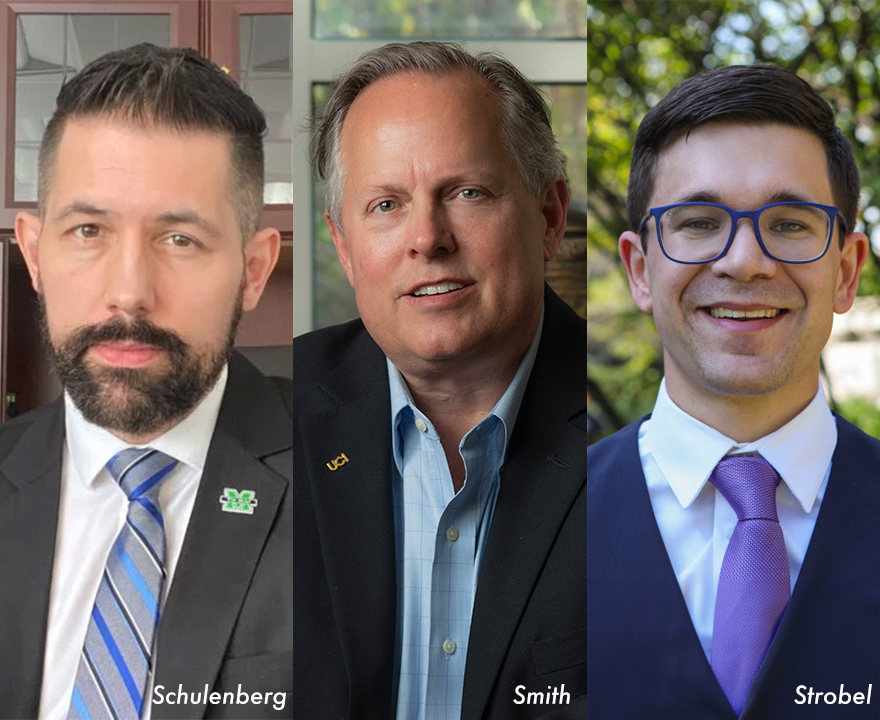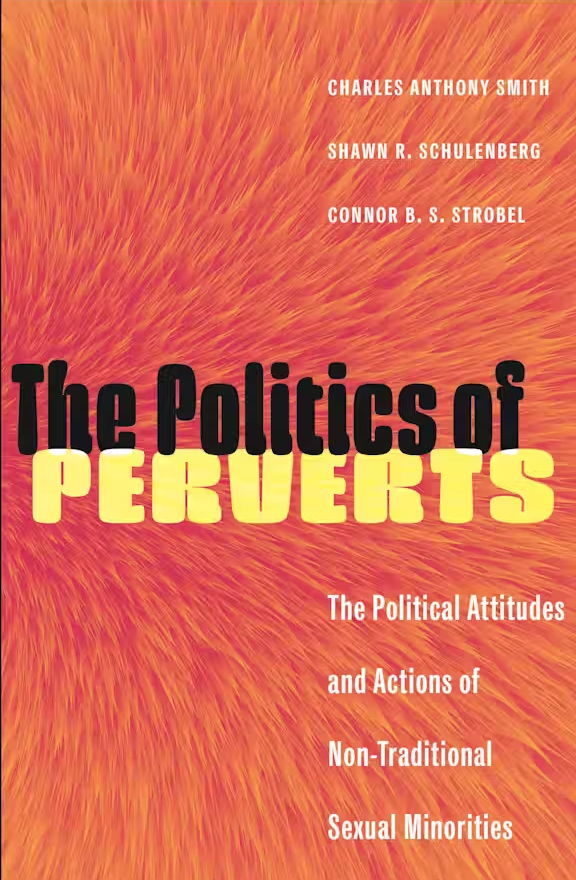The Politics of Perverts: The Political Attitudes and Actions of Non-Traditional Sexual Minorities

The Politics of Perverts: The Political Attitudes and Actions of Non-Traditional Sexual Minorities
- May 28, 2024
- UCI political science professor Tony Smith shares his latest book, coauthored with Shawn R. Schulenberg, Marshall University, and Connor B.S. Strobel, University of Chicago
 In their new book, The Politics of Perverts: The Political Attitudes and Actions of Non-Traditional Sexual
Minorities (NYU Press), UCI political science professor Tony Smith and coauthors Shawn R. Schulenberg, Marshall
University, and Connor B.S. Strobel, University of Chicago, explore the political
attitudes and activities of individuals who identify with non-traditional sexual orientations
and practices. Research took the coauthors to conventions, colonies, and support groups
where members of the polyamory, BDSM, nudist, and furry communities revealed and discussed
their politics. Below, Smith shares what motivated this work, some challenges he and
coauthors encountered, and key takeaways he hopes readers learn about a group that’s
collectively three times the size of the gay and lesbian population.
In their new book, The Politics of Perverts: The Political Attitudes and Actions of Non-Traditional Sexual
Minorities (NYU Press), UCI political science professor Tony Smith and coauthors Shawn R. Schulenberg, Marshall
University, and Connor B.S. Strobel, University of Chicago, explore the political
attitudes and activities of individuals who identify with non-traditional sexual orientations
and practices. Research took the coauthors to conventions, colonies, and support groups
where members of the polyamory, BDSM, nudist, and furry communities revealed and discussed
their politics. Below, Smith shares what motivated this work, some challenges he and
coauthors encountered, and key takeaways he hopes readers learn about a group that’s
collectively three times the size of the gay and lesbian population.
Q: Give us some background for this book. What motivated your in-depth research on the political attitudes and activities of individuals who identify with non-traditional sexual orientations and practices?
We started thinking about this project in a rigorous way when it became clear the United States Supreme Court was going to deliver marriage equality to the gay and lesbian community. We wondered where the field of sexuality and politics would go next and we also realized immediately that marriage equality for the gay and lesbian community nonetheless left many other members of these non-traditional sexual minority groups with no real legal protections.
Q: What were some of the biggest challenges you faced pursuing this work, and what was one of the most surprising findings about the political attitudes or actions within these communities?
We really faced two big obstacles. First, getting the members of the groups to trust us as we administered our surveys and conducted our interviews. The second big challenge was getting other people in the academy to understand the importance of the work. We were able to overcome the first obstacle by meeting the people where they were – whether at community conventions like Anthrocon (furries) or Beyond Vanilla (BDSM) or at permanent facilities (nudists) or through community support groups (polyamory). Eventually, those aware of the research have now really embraced it and it has spurred new research by other scholars. We were surprised by a few things – for instance that over a third of the people in these communities identify as bisexual. We were also surprised that some of the groups had more overlap than we anticipated.
Q: In the book, you discuss the discrimination, stigma, and lack of legal protections these communities face. Can you elaborate on the most pressing legal or policy changes needed to address these challenges?
Really there are two dimensions of gravest concern – first, in the field of family law, judges and juries tend to treat members of these communities very harshly. Of course, the BDSM community also faces serious legal jeopardy from a criminal perspective since consent is not a defense in any jurisdiction to any crimes of assault or battery. The second area of concern is more generally civil law as there is no employment non-discrimination protection or housing protection for members of these groups. Your boss can just decide they think you are creepy and then fire you.
Q: Given the evolving nature of sexual identities and politics, what are some areas of future research you believe are crucial to further understand the political dynamics of non-traditional sexual minorities?
We believe, based on the empirics that are the foundation of the research, that these groups together are roughly three times the size of the gay and lesbian population. If these groups can organize, they could be a transformative block of voters. Politicians have lagged far behind the public in developing their understanding of sexuality. Politics seem stuck in a bimodal understanding of the world as straight or not-straight with no room for variation or nuance. The reality of sex and sexuality is going to be the focal point of future research.
Q: What do you hope readers will take away from your work?
We hope that we can demystify these groups for our readers and that those unfamiliar with these communities will leave the work with a greater understanding of the shared humanity of these groups. At the end of day, we hope to elicit more empathy, compassion, and respect for these groups.
-----
Would you like to get more involved with the social sciences? Email us at communications@socsci.uci.edu to connect.
Share on:


connect with us: